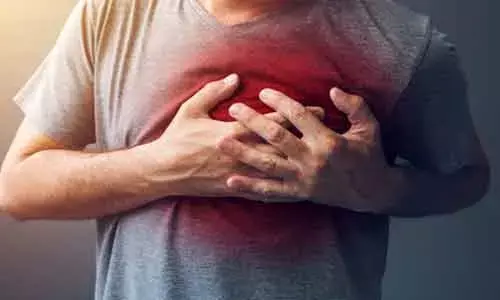- Home
- Medical news & Guidelines
- Anesthesiology
- Cardiology and CTVS
- Critical Care
- Dentistry
- Dermatology
- Diabetes and Endocrinology
- ENT
- Gastroenterology
- Medicine
- Nephrology
- Neurology
- Obstretics-Gynaecology
- Oncology
- Ophthalmology
- Orthopaedics
- Pediatrics-Neonatology
- Psychiatry
- Pulmonology
- Radiology
- Surgery
- Urology
- Laboratory Medicine
- Diet
- Nursing
- Paramedical
- Physiotherapy
- Health news
- Fact Check
- Bone Health Fact Check
- Brain Health Fact Check
- Cancer Related Fact Check
- Child Care Fact Check
- Dental and oral health fact check
- Diabetes and metabolic health fact check
- Diet and Nutrition Fact Check
- Eye and ENT Care Fact Check
- Fitness fact check
- Gut health fact check
- Heart health fact check
- Kidney health fact check
- Medical education fact check
- Men's health fact check
- Respiratory fact check
- Skin and hair care fact check
- Vaccine and Immunization fact check
- Women's health fact check
- AYUSH
- State News
- Andaman and Nicobar Islands
- Andhra Pradesh
- Arunachal Pradesh
- Assam
- Bihar
- Chandigarh
- Chattisgarh
- Dadra and Nagar Haveli
- Daman and Diu
- Delhi
- Goa
- Gujarat
- Haryana
- Himachal Pradesh
- Jammu & Kashmir
- Jharkhand
- Karnataka
- Kerala
- Ladakh
- Lakshadweep
- Madhya Pradesh
- Maharashtra
- Manipur
- Meghalaya
- Mizoram
- Nagaland
- Odisha
- Puducherry
- Punjab
- Rajasthan
- Sikkim
- Tamil Nadu
- Telangana
- Tripura
- Uttar Pradesh
- Uttrakhand
- West Bengal
- Medical Education
- Industry
After a heart attack, physical activity improves quality of life

Researchers have revealed that heart attack patients who take part in a lifestyle improvement programme feel better - especially when they do additional physical activity.The study has been presented on ACVC Essentials 4 You, a scientific platform of the European Society of Cardiology (ESC),
"Exercise improves fitness, which has both physical and mental health benefits," said study author Dr. Ben Hurdus of the University of Leeds, UK. "If you're more able to participate in activities that bring you happiness, then you're more likely to have a better quality of life."
Heart attack patients are typically offered lifestyle classes - called cardiac rehabilitation - unless they have a particular reason why it's not suitable for them. Classes include exercise, smoking cessation, advice on diet and stress management, and the importance of taking medications.
This study investigated the impact of those classes on how heart attack patients feel about their physical and mental health (collectively termed 'health-related quality of life'). Heart attacks have a detrimental effect on quality of life, including problems with mobility, self-care, and daily activities which many people take for granted such as work and leisure.
Previous research has shown a link between cardiac rehabilitation and improved quality of life in heart attack patients. However, most of these studies were conducted prior to modern drugs and procedures such as statins to lower 'bad' cholesterol and stents to open clogged arteries.
The EMMACE-3 study recruited 4,570 patients who were admitted to 48 hospitals across England with suspected heart attack in 2011 to 2013. Patients completed a questionnaire while in hospital and then at 1, 6, and 12 months after discharge. Questions included whether they attended cardiac rehabilitation, their perceived quality of life, and their physical activity levels.
Patients who attended cardiac rehabilitation had a higher quality of life at all time points compared to those who did not. Patients who went to cardiac rehabilitation and exercised 150 minutes or more per week had even higher quality of life scores compared to those who did neither.
Dr. Hurdus said: "Cardiac rehabilitation involves not only exercise but also advice on lifestyle and medications which likely all contribute to making people feel better. There are also the added social benefits such as being around other people in a similar situation and having that shared sense of community. People who also do more than the recommended minimum of 150 minutes of activity per week report even higher quality of life."
Professor Chris Gale, senior author from the University of Leeds concluded: "All heart attack patients should be referred for cardiac rehabilitation unless their healthcare professional advises against it. If it isn't discussed, speak to your local healthcare professional to see if is suitable for you."
Hina Zahid Joined Medical Dialogue in 2017 with a passion to work as a Reporter. She coordinates with various national and international journals and association and covers all the stories related to Medical guidelines, Medical Journals, rare medical surgeries as well as all the updates in the medical field. Email: editorial@medicaldialogues.in. Contact no. 011-43720751
Dr Kamal Kant Kohli-MBBS, DTCD- a chest specialist with more than 30 years of practice and a flair for writing clinical articles, Dr Kamal Kant Kohli joined Medical Dialogues as a Chief Editor of Medical News. Besides writing articles, as an editor, he proofreads and verifies all the medical content published on Medical Dialogues including those coming from journals, studies,medical conferences,guidelines etc. Email: drkohli@medicaldialogues.in. Contact no. 011-43720751


